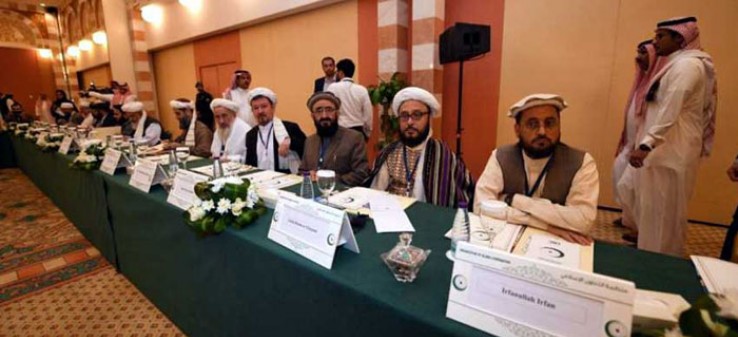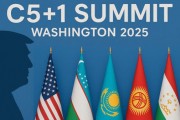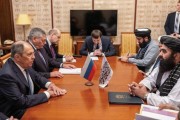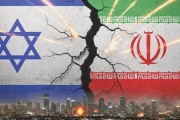Publish Date
Sunday 11 May 2025 - 13:25
recommended
0
The Taliban and international Treaties
The Taliban’s Approach to “International Treaties”: Nature and Consequences
Since the Taliban’s return to power in Afghanistan, the country’s international commitments has always been in the spotlight —often with a controversial edge. The Taliban’s formal announcement of Afghanistan’s withdrawal from obligations under the Rome Statute and the International Criminal Court (ICC)—a decision following arrest warrants issued for the group’s leader and senior officials—further amplified global concerns regarding the future of international engagement with the Taliban. This paper attempts to analyze the Taliban’s general stance regarding Afghanistan’s international obligations, and assess the implications this has for broader dynamics, such as the official recognition of their rule.
By: Mirahmad Reza Moshref
20 minutes reading
Introduction
Since the Taliban’s return to power in Afghanistan, the country’s international legal commitments have consistently attracted significant attention and has often taken on a controversial aspect. It seems that many key international challenges surrounding the new regime being deeply intertwined with this issue. Several recent developments have brought this matter to the forefront, most notably the United Nations Security Council (UNSC) session on extending the mandate of the UN Assistance Mission in Afghanistan (UNAMA). This session reignited debates around humanitarian aid, engagement with the Taliban, and how these issues connect to Afghanistan’s adherence to international obligations.
The Taliban’s official renunciation of the Rome Statute and their withdrawal from the ICC—particularly in reaction to arrest warrants for Taliban leaders—further intensified scrutiny regarding the group’s commitment to international norms. The potential return of Donald Trump to the White House and its implications for the international order adds another layer of uncertainty to this evolving picture.
In light of these events, this analysis aims to unpack the Taliban’s overall approach toward international treaties and obligations and examine how this approach may influence processes such as the formal recognition of the Taliban government by the international community.
The Taliban and the Redefinition of Afghanistan’s International Commitments
Since the Taliban’s return to power in Afghanistan, it seems that few legal concepts have been as repeatedly emphasized in international discussions as Afghanistan’s “international obligations.” Most UNSC resolutions have framed adherence to such obligations as a foundational requirement for recognizing and engaging with the Taliban. For example, Resolution 2615 (December 2021) urged the Taliban to respect international commitments, particularly in the areas of human rights and humanitarian operations. Similarly, Resolution 2721 stressed the necessity for Afghanistan to fulfill its international obligations as a precondition for full integration into the global community. In a recent UNSC briefing, UNAMA head Roza Otunbayeva explicitly cited the Taliban’s noncompliance with international obligations as a key obstacle to Afghanistan’s reintegration.
Despite these repeated calls, challenges, ambiguities, and disagreements persist over the meaning and operational scope of Afghanistan’s international obligations. From the global perspective, these obligations span a wide spectrum: forming an inclusive government, combating terrorism and narcotics, preventing Afghanistan from becoming a hub for regional or global threats, upholding international norms—especially concerning the rights of women, children, and minorities, and generally, all previously undertaken international commitments of former Afghan governments.
However, the Taliban have largely refrained from making explicit statements on the full scope of these obligations, instead expressing discontent with what they view as an overly expansive interpretation. According to their perspective, many of the so-called obligations imposed by the international community constitute interference in Afghanistan’s internal affairs, ignore the cultural and religious values of its people, or serve as tools for political pressure.
The Taliban also have some reasons for these claims. They argue that demands for inclusive governance and human rights protections are selectively applied and not enforced on other countries lacking these conditions. They view these requirements as “special terms” designed exclusively for their recognition.
The Taliban also references the Doha Agreement signed with the United States. In that accord, the group’s international obligations were primarily confined to preventing terrorist activity within their territory and ensuring Afghanistan posed no threat to its neighbors, the region, or the broader world. The agreement made no explicit mention of human rights or other broader international legal responsibilities.
Furthermore, Article III of Part Three of the agreement commits the United States to non-interference in Afghanistan’s internal affairs. Therefore, the Taliban believe that international demands on them go beyond the norm of international demands and conditions, and their goal is simply to intervene and exert political pressure, especially from major powers.
In this Context, it must also be acknowledged that the international community itself faces ambiguity in defining and operationalizing its interpretation of Afghanistan’s obligations. This is reflected in UNSC Resolutions 2679 and 2721, where the Security Council, guided by a special assessment from UN Special Representative Feridun Sinirlioğlu, sought to develop a roadmap for engagement with the Taliban. To outline the roadmap, Sinirlioğlu points to several key issues such as human rights, counter-terrorism, narcotics control, economic development, and the rule of law. Finally, the report and the Security Council resolution emphasized that one of the main lines of this roadmap is to clearly define “Afghanistan’s international obligations” and establish measurable benchmarks to evaluate their progress. This reveals the conceptual and practical complexity of the issue and the need for further clarity.
Yet, even with this emphasis, Resolution 2721 stopped short of explicitly conditioning Afghanistan’s full integration into the international system on the Taliban's fulfillment of these obligations; And this is the ambiguous point of the story. Meanwhile, the UN’s convening of the third Doha meeting added another layer of ambiguity and complexity: the absence of women, civil society representatives, and opposition voices from the main sessions of Doha III raised serious questions about how the international community now interprets the Taliban’s global obligations, as well as whether there have been any changes in global beliefs in this regard. Coupled with differing views among Security Council members—especially Russia and China—on the nature and extent of Afghanistan’s obligations, it highlights what conceptual difficulties and disagreements currently exist on this issue.
The Link Between Official Recognition and International Obligations
The issue of officially recognizing the Taliban regime is closely tied to Afghanistan’s international commitments. Numerous declarations and resolutions have emphasized that recognition and reintegration into the global order hinge on adherence to international norms. UN Secretary-General António Guterres’ August 2021 statement—that said the regime seizing power by force and lacking inclusivity should not be officially recognized—and UNSC Resolution 2596 (September 2021), which called for an inclusive government and respect for the rights of women, children, and minorities, reflect a consistent policy line upheld in the past several years.
On the other hand, the Taliban themselves acknowledge a link between meeting international expectations and gaining formal recognition. In the early months of their rule, Taliban leader Hibatullah Akhundzada called on the international community to recognize the Islamic Emirate so that problems could be resolved officially and diplomatically. Taliban spokesperson Zabihullah Mujahid has repeatedly emphasized the need for Afghanistan’s active participation in international relations. In response to remarks by the Japanese ambassador concerning women’s rights, he stated that while some obligations have been met, others would be addressed only after the regime is formally recognized. He reiterated this stance after the third Doha meeting, linking adherence to international conventions and treaties to the Taliban’s inclusion under the umbrella of the United Nations.
However, the positions of the international community, along with those of the Taliban, regarding the link between international commitments and the formal recognition of Afghanistan's new rulers, raise two fundamental questions in this context.
The first question is whether the international community can condition the official recognition of a government and political authority on the fulfillment of international commitments or the realization of international values.
The second question concerns the precedence between the formal and international recognition of a political authority and the demand for international commitments and expectations from that authority.
Undoubtedly, answering both questions entails legal complexities and subtleties. However, from a broad perspective and based on the views of experts in international law as well as the practices of international institutions, several important points can be considered.
First, in response to the initial question, some experts in international law acknowledge an evolutionary process in the formal recognition of governments within the international community. According to these experts, in the past, the formation and recognition of governments were based on traditional principles, such as the possession of the four elements (population, territory, government, and the capacity to enter into relations with other states). Over time, particularly following the catastrophic World Wars I and II, normative elements emerged, and there was a shift from the criterion of "effective control" toward the necessity of acquiring both domestic and international "legitimacy" in the process of recognizing in the international arena. Accordingly, in several instances, the international community and states have refrained from granting formal recognition to new political entities that were in contradiction or conflict with jus cogens norms and international values. The refusal to recognize the Taliban’s regime during their first rule in Afghanistan, as well as the non-recognition of the Islamic State (ISIS) in the Middle East, are significant examples of this trend.
Nonetheless, this cannot be interpreted as a binding legal rule without exceptions, since during the same period, there have been governments and regimes that emerged contrary to these international standards yet faced no obstacles in obtaining recognition. Therefore, as with many rules and customs of international law, it seems that factors such as consensus among the international community as well as the stances of major powers—especially the United States in recent decades—have played a decisive role in this issue.
With regard to the order of precedence between formal recognition and the demand for international commitments—a point also emphasized by the Taliban—several key observations can be made. First, we must once again return to the issue of jus cogens norms and the prevailing values of the international community. According to most scholars of international law, the implementation of these norms are not contingent on whether a government has been formally recognized or not. The scholars believe that these norms must be enforced regardless of this issue, in order to maintain general international order and security.
The second issue is the principle of "State Succession on International Responsibility". It means that political authority and the obligations deriving from it are emerging with the formation of a state, and do not vanish or change with the replacement of governments. Therefore, when a political entity exercises effective (de facto) control over a territory and functions like a state, it is inherently expected—regardless of its formal recognition—to uphold internationally accepted standards and commitments.
Specifically regarding the Taliban, the United Nations and the Security Council have taken a clear position on this matter. Security Council Resolution 2615, for instance, does not consider itself bound to the formal recognition of the Taliban, and instead directly addresses the group, calling on them to fulfill international obligations and adhere to globally accepted standards expected of governing authorities. Similarly, Resolution 2721, which aims to define a framework for engagement with the Taliban, reaffirms the Taliban’s responsibility to implement international commitments.
The Taliban Government and Afghanistan's Prior International Commitments
One of the key demands of the international community from the Taliban is their obligation to respect the international commitments made by previous Afghan governments.
As the de facto governing authority, the Taliban inherit many of the international obligations and debts of the former Republic, and even those of earlier governments. This obligation is clearly stated based on the principle of "State Succession on International Responsibility " as interpreted in the Vienna Convention on the Law of Treaties (1969) and the Vienna Convention on Succession of States in respect of Treaties (1978).
Afghanistan has a long history of adhering to international treaties, especially in the area of human rights. It was among the first countries to vote in favor of the Universal Declaration of Human Rights in 1948 and pledged its commitment to many of the protocols and optional instruments related to it. During the Republican era, Afghanistan acceded to numerous international treaties and joined many global institutions. Its accession to several major treaties concerning civil rights and women’s rights, as well as its acceptance of the Rome Statute and membership in the International Criminal Court, form part of these commitments. Perhaps it is because of this extensive participation and membership in international forums that the phrase “Afghanistan’s reintegration into the international community” has now been framed as a substitute for the formal recognition of the Taliban regime.
Meanwhile, the Taliban's response to these demands for commitment is, in itself, noteworthy. On one hand, they have remained silent on these obligations and on their stance toward international conventions, even avoiding answering related questions. On the other hand, they have adopted a selective approach toward Afghanistan’s international obligations. This selective approach has also been highlighted by Roza Otunbayeva, the head of UNAMA: “The de facto authorities have so far treated the Afghan state’s international obligations selectively, rejecting some on the basis they allegedly impinge on the country’s sovereignty or violate their traditions.”
If we delve deeper into the details of this selective attitude, we see, on the one hand, the Taliban's close cooperation with international institutions in areas such as counter-narcotics and humanitarian aid, while on the other hand, we observe their rejection of the positions and decisions of human rights bodies in areas like women’s rights and civil liberties, which they view as intrusive.
It also seems that certain international concerns and trends have worked in the Taliban’s favor and have helped reinforce this selective approach. The urgent humanitarian needs of the Afghan population, who are facing severe economic and living conditions, have led to greater calls in UN resolutions for engagement with the Taliban.
At the same time, there are those who argue that the international community and, by extension, international institutions should accept the Taliban’s stance and maintain a certain level of engagement with them to prevent Afghanistan’s further descent into extremism and violence. However, recently, doubts have been raised about the effectiveness of such an approach. As the head of UNAMA noted, many countries have grown disillusioned, and the space for engagement with the Taliban has narrowed. In her view, the Taliban’s increasing distance from international engagement could embolden hardliners within the group and lead to even more restrictions on the Afghan population.
The Conflict Between “Domestic Sovereignty” and “International Commitments”
In the face of strong and widespread international demands regarding human rights and the fulfillment of Afghanistan’s international commitments, the Taliban often argue that these issues fall under domestic sovereignty and are based on the religious and cultural beliefs of the Afghan people. Therefore, from the perspective of the high-ranking officials of the Islamic Emirate of the Taliban, international pressure in this regard constitutes a violation of sovereignty and a blatant interference in Afghanistan’s internal affairs. Taliban Defense Minister Mullah Yaqoob stated: “They should never interfere in the internal affairs of the country; they should not interfere with our beliefs, nor with our government system and its nature. They should only discuss matters that they see as a threat to themselves or matters of shared concern.”
Although the Taliban’s claims may be partially valid in certain respects—such as the often contradictory international approaches to human rights in various countries, their own commitments based on the Doha agreement with the United States, or ambiguities regarding the extent of the Taliban’s international obligations—there is no denying that the Taliban have faced challenges to clearly delineate the boundary between national sovereignty and international commitments.
The first aspect to consider is the international legal framework regarding gross violations of jus cogens norms, which may fall under international crimes, particularly war crimes and crimes against humanity. From the perspective of the international community, these norms could include the Taliban’s policies that prevent girls and women from accessing education and employment.
The statement by 40 member states of the UN Human Rights Council advocating for this issue to be categorized under the Convention on Crimes Against Humanity, and the International Criminal Court’s (ICC) warrant for the arrest of certain high-ranking Taliban officials, can be justified on this basis.
On the other hand, it must be noted that Afghanistan has been at the center of attention of the United Nations and the Security Council for several decades. Therefore, until a stable and broadly accepted government is established domestically and internationally, this attention—and as a result, involvement in various processes related to the country—will likely continue. It is evident that the Taliban’s efforts to normalize Afghanistan’s situation and put an end to this process, such as their opposition to the appointment of a UN special envoy, have so far been unsuccessful.
Ultimately, the Taliban must acknowledge that many of the issues they consider foreign interference in Afghanistan’s internal affairs stem from the international obligations of previous Afghan governments. Therefore, disregarding them cannot be considered purely a domestic matter.
As long as the Taliban do not adopt a clear and explicit stance on these international commitments and continue their selective approach, the challenge of determining the boundaries between domestic sovereignty and international obligations will persist. This understanding of the situation may have led the Taliban to make the distinctive and unprecedented decision to withdraw from the Rome Statute and the ICC.
The Taliban and the Difficulty of Withdrawing from International Treaties
The ICC’s decision to issue arrest warrants for several top Taliban officials, including the group’s leadership, placed the Kabul regime in a difficult position. The previous Afghan government acceded to the Rome Statute in 2003, and the ICC had been investigating alleged war crimes committed in Afghanistan. This case involves three parties: U.S. military and intelligence personnel, the Taliban, and former Afghan National Army forces. While this case remained unresolved for years, the ICC’s swift move to issue warrants against Taliban leaders came as a surprise. This action prevented the Taliban from continuing their previous selective and ambiguous handling of international obligations inherited from past Afghan governments on this issue.
In such circumstances, the Taliban’s declaration of Afghanistan’s withdrawal from the Rome Statute and the ICC could be seen as a logical reaction. However, this action raises new questions and legal ambiguities.
At the most basic level, one may ask whether, given the lack of international recognition of the Taliban’s government, this withdrawal has any legal validity. Some legal scholars argue that joining or withdrawing from an international treaty is a right exclusively reserved for a legitimate and internationally recognized state.
Another important question is whether the Taliban’s move could nullify the ICC’s responsibility to continue addressing Afghanistan-related issues, particularly the arrest warrants for Taliban leaders? This matter also involves legal complexities—such as the rule that a withdrawal from the ICC only becomes effective one year after notification, and that The Court has jurisdiction to hear cases submitted before the withdrawal or even during the period of completion of the withdrawal process. Therefore, the Taliban’s swift withdrawal is unlikely to significantly affect the progression of their case at the ICC.
Finally, the Taliban’s decision to withdraw from the Rome Statute raises a broader question: can they similarly withdraw from other international treaties accepted by previous Afghan governments? In response, while such action may be legally possible for the Taliban, under the 1969 Vienna Convention on the Law of Treaties, the conditions for withdrawal from international treaties are complex and, in some cases, extremely difficult to fulfill. For instance, according to Article 54 of the Convention, the termination of a treaty or a party’s withdrawal is only permissible in accordance with the treaty’s provisions or through consultation and agreement with all other parties.
Conclusion
Given recent developments, the issue of Afghanistan’s international obligations—and how they intersect with matters such as engagement with the Taliban and their formal recognition by the international community—has come to the forefront. In the meanwhile, The Taliban’s approach toward these commitments have taken various forms: Silence and ambiguity in their overall stance, and highly selective adherence to international obligations; linking the fulfillment of some obligations to formal international recognition; accusing states and international bodies of applying political pressure; portraying external involvement as interference in Afghanistan’s internal affairs; and, finally, making decisions such as the official withdrawal from the Rome Statute and the ICC.
In this context, the international community and relevant institutions have adopted a relatively cautious approach, for reasons such as humanitarian concerns, fears of Afghanistan’s descent into deeper extremism and violence, and internal divisions over how to integrate the Taliban into the international system. The third Doha meeting and its conditions and outcomes demonstrated that the combination of these factors has largely worked in the Taliban’s favor.
Meanwhile, major international developments—such as the return of Donald Trump to the White House and the further weakening of shared international values and institutions— have made it difficult to hope for a change in the Taliban's approach toward international commitments.
Given these developments, it would not be surprising to witness a growing divergence between issues related to the “international recognition of the Taliban” and “Afghanistan’s international commitments” in the future.
Mirahmad Reza Moshref is a Researcher on Afghan Affairs.
20 minutes reading
The Taliban’s Approach to “International Treaties”: Nature and Consequences
Introduction
Since the Taliban’s return to power in Afghanistan, the country’s international legal commitments have consistently attracted significant attention and has often taken on a controversial aspect. It seems that many key international challenges surrounding the new regime being deeply intertwined with this issue. Several recent developments have brought this matter to the forefront, most notably the United Nations Security Council (UNSC) session on extending the mandate of the UN Assistance Mission in Afghanistan (UNAMA). This session reignited debates around humanitarian aid, engagement with the Taliban, and how these issues connect to Afghanistan’s adherence to international obligations.
The Taliban’s official renunciation of the Rome Statute and their withdrawal from the ICC—particularly in reaction to arrest warrants for Taliban leaders—further intensified scrutiny regarding the group’s commitment to international norms. The potential return of Donald Trump to the White House and its implications for the international order adds another layer of uncertainty to this evolving picture.
In light of these events, this analysis aims to unpack the Taliban’s overall approach toward international treaties and obligations and examine how this approach may influence processes such as the formal recognition of the Taliban government by the international community.
The Taliban and the Redefinition of Afghanistan’s International Commitments
Since the Taliban’s return to power in Afghanistan, it seems that few legal concepts have been as repeatedly emphasized in international discussions as Afghanistan’s “international obligations.” Most UNSC resolutions have framed adherence to such obligations as a foundational requirement for recognizing and engaging with the Taliban. For example, Resolution 2615 (December 2021) urged the Taliban to respect international commitments, particularly in the areas of human rights and humanitarian operations. Similarly, Resolution 2721 stressed the necessity for Afghanistan to fulfill its international obligations as a precondition for full integration into the global community. In a recent UNSC briefing, UNAMA head Roza Otunbayeva explicitly cited the Taliban’s noncompliance with international obligations as a key obstacle to Afghanistan’s reintegration.
Despite these repeated calls, challenges, ambiguities, and disagreements persist over the meaning and operational scope of Afghanistan’s international obligations. From the global perspective, these obligations span a wide spectrum: forming an inclusive government, combating terrorism and narcotics, preventing Afghanistan from becoming a hub for regional or global threats, upholding international norms—especially concerning the rights of women, children, and minorities, and generally, all previously undertaken international commitments of former Afghan governments.
However, the Taliban have largely refrained from making explicit statements on the full scope of these obligations, instead expressing discontent with what they view as an overly expansive interpretation. According to their perspective, many of the so-called obligations imposed by the international community constitute interference in Afghanistan’s internal affairs, ignore the cultural and religious values of its people, or serve as tools for political pressure.
The Taliban also have some reasons for these claims. They argue that demands for inclusive governance and human rights protections are selectively applied and not enforced on other countries lacking these conditions. They view these requirements as “special terms” designed exclusively for their recognition.
The Taliban also references the Doha Agreement signed with the United States. In that accord, the group’s international obligations were primarily confined to preventing terrorist activity within their territory and ensuring Afghanistan posed no threat to its neighbors, the region, or the broader world. The agreement made no explicit mention of human rights or other broader international legal responsibilities.
Furthermore, Article III of Part Three of the agreement commits the United States to non-interference in Afghanistan’s internal affairs. Therefore, the Taliban believe that international demands on them go beyond the norm of international demands and conditions, and their goal is simply to intervene and exert political pressure, especially from major powers.
In this Context, it must also be acknowledged that the international community itself faces ambiguity in defining and operationalizing its interpretation of Afghanistan’s obligations. This is reflected in UNSC Resolutions 2679 and 2721, where the Security Council, guided by a special assessment from UN Special Representative Feridun Sinirlioğlu, sought to develop a roadmap for engagement with the Taliban. To outline the roadmap, Sinirlioğlu points to several key issues such as human rights, counter-terrorism, narcotics control, economic development, and the rule of law. Finally, the report and the Security Council resolution emphasized that one of the main lines of this roadmap is to clearly define “Afghanistan’s international obligations” and establish measurable benchmarks to evaluate their progress. This reveals the conceptual and practical complexity of the issue and the need for further clarity.
Yet, even with this emphasis, Resolution 2721 stopped short of explicitly conditioning Afghanistan’s full integration into the international system on the Taliban's fulfillment of these obligations; And this is the ambiguous point of the story. Meanwhile, the UN’s convening of the third Doha meeting added another layer of ambiguity and complexity: the absence of women, civil society representatives, and opposition voices from the main sessions of Doha III raised serious questions about how the international community now interprets the Taliban’s global obligations, as well as whether there have been any changes in global beliefs in this regard. Coupled with differing views among Security Council members—especially Russia and China—on the nature and extent of Afghanistan’s obligations, it highlights what conceptual difficulties and disagreements currently exist on this issue.
The Link Between Official Recognition and International Obligations
The issue of officially recognizing the Taliban regime is closely tied to Afghanistan’s international commitments. Numerous declarations and resolutions have emphasized that recognition and reintegration into the global order hinge on adherence to international norms. UN Secretary-General António Guterres’ August 2021 statement—that said the regime seizing power by force and lacking inclusivity should not be officially recognized—and UNSC Resolution 2596 (September 2021), which called for an inclusive government and respect for the rights of women, children, and minorities, reflect a consistent policy line upheld in the past several years.
On the other hand, the Taliban themselves acknowledge a link between meeting international expectations and gaining formal recognition. In the early months of their rule, Taliban leader Hibatullah Akhundzada called on the international community to recognize the Islamic Emirate so that problems could be resolved officially and diplomatically. Taliban spokesperson Zabihullah Mujahid has repeatedly emphasized the need for Afghanistan’s active participation in international relations. In response to remarks by the Japanese ambassador concerning women’s rights, he stated that while some obligations have been met, others would be addressed only after the regime is formally recognized. He reiterated this stance after the third Doha meeting, linking adherence to international conventions and treaties to the Taliban’s inclusion under the umbrella of the United Nations.
However, the positions of the international community, along with those of the Taliban, regarding the link between international commitments and the formal recognition of Afghanistan's new rulers, raise two fundamental questions in this context.
The first question is whether the international community can condition the official recognition of a government and political authority on the fulfillment of international commitments or the realization of international values.
The second question concerns the precedence between the formal and international recognition of a political authority and the demand for international commitments and expectations from that authority.
Undoubtedly, answering both questions entails legal complexities and subtleties. However, from a broad perspective and based on the views of experts in international law as well as the practices of international institutions, several important points can be considered.
First, in response to the initial question, some experts in international law acknowledge an evolutionary process in the formal recognition of governments within the international community. According to these experts, in the past, the formation and recognition of governments were based on traditional principles, such as the possession of the four elements (population, territory, government, and the capacity to enter into relations with other states). Over time, particularly following the catastrophic World Wars I and II, normative elements emerged, and there was a shift from the criterion of "effective control" toward the necessity of acquiring both domestic and international "legitimacy" in the process of recognizing in the international arena. Accordingly, in several instances, the international community and states have refrained from granting formal recognition to new political entities that were in contradiction or conflict with jus cogens norms and international values. The refusal to recognize the Taliban’s regime during their first rule in Afghanistan, as well as the non-recognition of the Islamic State (ISIS) in the Middle East, are significant examples of this trend.
Nonetheless, this cannot be interpreted as a binding legal rule without exceptions, since during the same period, there have been governments and regimes that emerged contrary to these international standards yet faced no obstacles in obtaining recognition. Therefore, as with many rules and customs of international law, it seems that factors such as consensus among the international community as well as the stances of major powers—especially the United States in recent decades—have played a decisive role in this issue.
With regard to the order of precedence between formal recognition and the demand for international commitments—a point also emphasized by the Taliban—several key observations can be made. First, we must once again return to the issue of jus cogens norms and the prevailing values of the international community. According to most scholars of international law, the implementation of these norms are not contingent on whether a government has been formally recognized or not. The scholars believe that these norms must be enforced regardless of this issue, in order to maintain general international order and security.
The second issue is the principle of "State Succession on International Responsibility". It means that political authority and the obligations deriving from it are emerging with the formation of a state, and do not vanish or change with the replacement of governments. Therefore, when a political entity exercises effective (de facto) control over a territory and functions like a state, it is inherently expected—regardless of its formal recognition—to uphold internationally accepted standards and commitments.
Specifically regarding the Taliban, the United Nations and the Security Council have taken a clear position on this matter. Security Council Resolution 2615, for instance, does not consider itself bound to the formal recognition of the Taliban, and instead directly addresses the group, calling on them to fulfill international obligations and adhere to globally accepted standards expected of governing authorities. Similarly, Resolution 2721, which aims to define a framework for engagement with the Taliban, reaffirms the Taliban’s responsibility to implement international commitments.
The Taliban Government and Afghanistan's Prior International Commitments
One of the key demands of the international community from the Taliban is their obligation to respect the international commitments made by previous Afghan governments.
As the de facto governing authority, the Taliban inherit many of the international obligations and debts of the former Republic, and even those of earlier governments. This obligation is clearly stated based on the principle of "State Succession on International Responsibility " as interpreted in the Vienna Convention on the Law of Treaties (1969) and the Vienna Convention on Succession of States in respect of Treaties (1978).
Afghanistan has a long history of adhering to international treaties, especially in the area of human rights. It was among the first countries to vote in favor of the Universal Declaration of Human Rights in 1948 and pledged its commitment to many of the protocols and optional instruments related to it. During the Republican era, Afghanistan acceded to numerous international treaties and joined many global institutions. Its accession to several major treaties concerning civil rights and women’s rights, as well as its acceptance of the Rome Statute and membership in the International Criminal Court, form part of these commitments. Perhaps it is because of this extensive participation and membership in international forums that the phrase “Afghanistan’s reintegration into the international community” has now been framed as a substitute for the formal recognition of the Taliban regime.
Meanwhile, the Taliban's response to these demands for commitment is, in itself, noteworthy. On one hand, they have remained silent on these obligations and on their stance toward international conventions, even avoiding answering related questions. On the other hand, they have adopted a selective approach toward Afghanistan’s international obligations. This selective approach has also been highlighted by Roza Otunbayeva, the head of UNAMA: “The de facto authorities have so far treated the Afghan state’s international obligations selectively, rejecting some on the basis they allegedly impinge on the country’s sovereignty or violate their traditions.”
If we delve deeper into the details of this selective attitude, we see, on the one hand, the Taliban's close cooperation with international institutions in areas such as counter-narcotics and humanitarian aid, while on the other hand, we observe their rejection of the positions and decisions of human rights bodies in areas like women’s rights and civil liberties, which they view as intrusive.
It also seems that certain international concerns and trends have worked in the Taliban’s favor and have helped reinforce this selective approach. The urgent humanitarian needs of the Afghan population, who are facing severe economic and living conditions, have led to greater calls in UN resolutions for engagement with the Taliban.
At the same time, there are those who argue that the international community and, by extension, international institutions should accept the Taliban’s stance and maintain a certain level of engagement with them to prevent Afghanistan’s further descent into extremism and violence. However, recently, doubts have been raised about the effectiveness of such an approach. As the head of UNAMA noted, many countries have grown disillusioned, and the space for engagement with the Taliban has narrowed. In her view, the Taliban’s increasing distance from international engagement could embolden hardliners within the group and lead to even more restrictions on the Afghan population.
The Conflict Between “Domestic Sovereignty” and “International Commitments”
In the face of strong and widespread international demands regarding human rights and the fulfillment of Afghanistan’s international commitments, the Taliban often argue that these issues fall under domestic sovereignty and are based on the religious and cultural beliefs of the Afghan people. Therefore, from the perspective of the high-ranking officials of the Islamic Emirate of the Taliban, international pressure in this regard constitutes a violation of sovereignty and a blatant interference in Afghanistan’s internal affairs. Taliban Defense Minister Mullah Yaqoob stated: “They should never interfere in the internal affairs of the country; they should not interfere with our beliefs, nor with our government system and its nature. They should only discuss matters that they see as a threat to themselves or matters of shared concern.”
Although the Taliban’s claims may be partially valid in certain respects—such as the often contradictory international approaches to human rights in various countries, their own commitments based on the Doha agreement with the United States, or ambiguities regarding the extent of the Taliban’s international obligations—there is no denying that the Taliban have faced challenges to clearly delineate the boundary between national sovereignty and international commitments.
The first aspect to consider is the international legal framework regarding gross violations of jus cogens norms, which may fall under international crimes, particularly war crimes and crimes against humanity. From the perspective of the international community, these norms could include the Taliban’s policies that prevent girls and women from accessing education and employment.
The statement by 40 member states of the UN Human Rights Council advocating for this issue to be categorized under the Convention on Crimes Against Humanity, and the International Criminal Court’s (ICC) warrant for the arrest of certain high-ranking Taliban officials, can be justified on this basis.
On the other hand, it must be noted that Afghanistan has been at the center of attention of the United Nations and the Security Council for several decades. Therefore, until a stable and broadly accepted government is established domestically and internationally, this attention—and as a result, involvement in various processes related to the country—will likely continue. It is evident that the Taliban’s efforts to normalize Afghanistan’s situation and put an end to this process, such as their opposition to the appointment of a UN special envoy, have so far been unsuccessful.
Ultimately, the Taliban must acknowledge that many of the issues they consider foreign interference in Afghanistan’s internal affairs stem from the international obligations of previous Afghan governments. Therefore, disregarding them cannot be considered purely a domestic matter.
As long as the Taliban do not adopt a clear and explicit stance on these international commitments and continue their selective approach, the challenge of determining the boundaries between domestic sovereignty and international obligations will persist. This understanding of the situation may have led the Taliban to make the distinctive and unprecedented decision to withdraw from the Rome Statute and the ICC.
The Taliban and the Difficulty of Withdrawing from International Treaties
The ICC’s decision to issue arrest warrants for several top Taliban officials, including the group’s leadership, placed the Kabul regime in a difficult position. The previous Afghan government acceded to the Rome Statute in 2003, and the ICC had been investigating alleged war crimes committed in Afghanistan. This case involves three parties: U.S. military and intelligence personnel, the Taliban, and former Afghan National Army forces. While this case remained unresolved for years, the ICC’s swift move to issue warrants against Taliban leaders came as a surprise. This action prevented the Taliban from continuing their previous selective and ambiguous handling of international obligations inherited from past Afghan governments on this issue.
In such circumstances, the Taliban’s declaration of Afghanistan’s withdrawal from the Rome Statute and the ICC could be seen as a logical reaction. However, this action raises new questions and legal ambiguities.
At the most basic level, one may ask whether, given the lack of international recognition of the Taliban’s government, this withdrawal has any legal validity. Some legal scholars argue that joining or withdrawing from an international treaty is a right exclusively reserved for a legitimate and internationally recognized state.
Another important question is whether the Taliban’s move could nullify the ICC’s responsibility to continue addressing Afghanistan-related issues, particularly the arrest warrants for Taliban leaders? This matter also involves legal complexities—such as the rule that a withdrawal from the ICC only becomes effective one year after notification, and that The Court has jurisdiction to hear cases submitted before the withdrawal or even during the period of completion of the withdrawal process. Therefore, the Taliban’s swift withdrawal is unlikely to significantly affect the progression of their case at the ICC.
Finally, the Taliban’s decision to withdraw from the Rome Statute raises a broader question: can they similarly withdraw from other international treaties accepted by previous Afghan governments? In response, while such action may be legally possible for the Taliban, under the 1969 Vienna Convention on the Law of Treaties, the conditions for withdrawal from international treaties are complex and, in some cases, extremely difficult to fulfill. For instance, according to Article 54 of the Convention, the termination of a treaty or a party’s withdrawal is only permissible in accordance with the treaty’s provisions or through consultation and agreement with all other parties.
Conclusion
Given recent developments, the issue of Afghanistan’s international obligations—and how they intersect with matters such as engagement with the Taliban and their formal recognition by the international community—has come to the forefront. In the meanwhile, The Taliban’s approach toward these commitments have taken various forms: Silence and ambiguity in their overall stance, and highly selective adherence to international obligations; linking the fulfillment of some obligations to formal international recognition; accusing states and international bodies of applying political pressure; portraying external involvement as interference in Afghanistan’s internal affairs; and, finally, making decisions such as the official withdrawal from the Rome Statute and the ICC.
In this context, the international community and relevant institutions have adopted a relatively cautious approach, for reasons such as humanitarian concerns, fears of Afghanistan’s descent into deeper extremism and violence, and internal divisions over how to integrate the Taliban into the international system. The third Doha meeting and its conditions and outcomes demonstrated that the combination of these factors has largely worked in the Taliban’s favor.
Meanwhile, major international developments—such as the return of Donald Trump to the White House and the further weakening of shared international values and institutions— have made it difficult to hope for a change in the Taliban's approach toward international commitments.
Given these developments, it would not be surprising to witness a growing divergence between issues related to the “international recognition of the Taliban” and “Afghanistan’s international commitments” in the future.
Mirahmad Reza Moshref is a Researcher on Afghan Affairs.
News code:4014















